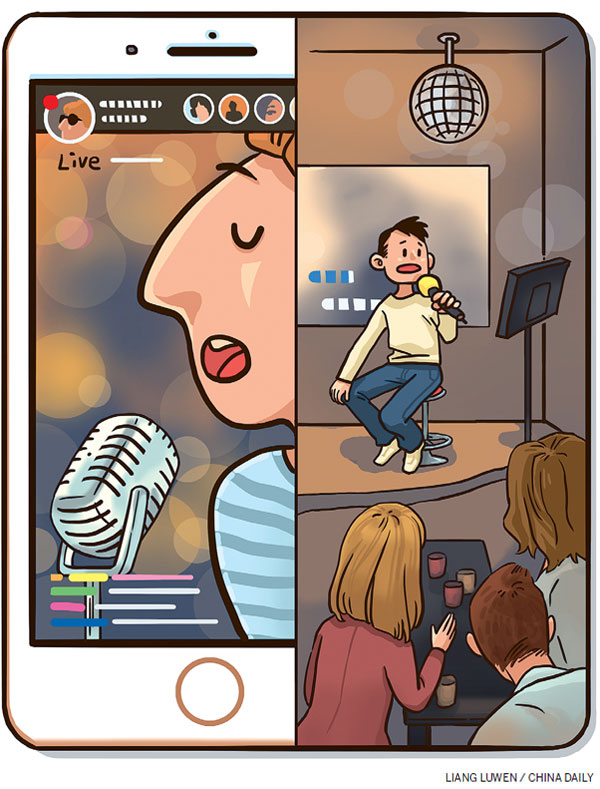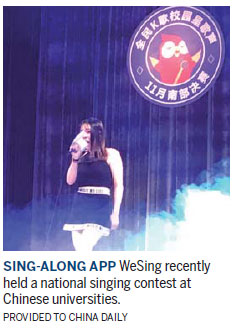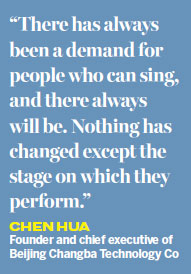Song apps provide a new stage for fame
It's the dead of night and Yang Jie is staring at her mobile phone and feeling sentimental. She puts on her headphones, swipes the screen and starts to record herself singing along with the music coming from it.
"I love singing because it helps me relax, especially when I'm feeling down," says Yang, 28, an office worker from Beijing. She particularly likes singing pop songs by stars such as Karen Joy Morris and Rene Liu and posting her versions online.
"When someone clicks a 'like' button to my song on the app, I feel a sense of achievement and post more songs," she says.
Millions of Chinese have taken to using such apps in recent years as a way of entertaining themselves and earning kudos from friends and strangers. In their quest for praise and inner satisfaction they can send their performances to those they know, or share them on their social media.

|
Participants in the WeSing contest can stream their voices live. Photos Provided to China Daily |
Users can broadcast through live streaming or can videotape themselves and upload the clip later. If they lack the skills to sing a song in their own style they can closely follow the style of a recorded original. And if what they produce leaves something to be desired, they can even modify the way their voice sounds. They can also compete with others to be in the app's ranking list to draw more fans.
Some well-known singers use apps so their fans can interact with them.
"It's human nature to sing," says Chen Hua, founder and chief executive of Beijing Changba Technology Co.
"There has always been a demand for people who can sing, and there always will be. Nothing has changed except the stage on which they perform."
Changba says its karaoke app has about 30 million active users a month on average, about 62 percent of them female. Most users are between 20 and 25.

Chen says users are always wanting changes and new features, which means the company is constantly having to upgrade the app.
"The social aspects are important in our app. Users can interact with those who have things in common with them," Chen says.
Ji Mingzhong, product director of the digital music department of Tencent Music Entertainment (Shenzhen) Co, says: "A mobile app allows you to distribute your beautiful singing online."
The company is owned by Chinese internet giant Tencent Inc. Tencent's WeSing offers users a strong social network, thanks to the support of its popular instant messaging apps WeChat and QQ.
"The connectivity function plays an important role in keeping app users active," Ji says. "You can interact with friends, for example by listening to their singing and you can sing in chorus with them. You can also challenge your friends."
Prospects for the market are good and getting better, he says.
"It's essential to integrate singing with other fields, such as short videos and live broadcasting, or expand the settings within which the performances take place and to seek out good-quality content."
Many of those who use the app will have been influenced by acquaintances who use it, he says.
As long as you have talent you can build up a fan base through the app and even become well known, without having to take part in a singing contest on TV, he says.
"As a singing platform, the app helps independent musicians get their work known and it improves their incomes so they can make ends meet."
Some live stream, singing or chatting with fans. Income depends on how many virtual gifts they receive from fans.
For Liu Xingtong, 36, a mobile karaoke app is a good substitute for a karaoke bar.

"The thing about the app is that I can sing with it whenever I want," says Liu, an office worker from Guangzhou. "Now, rather than going out with friends, all I want to do is sing with all my heart. It's a bit of a difficult situation because I know that if I were in a karaoke bar with them, some would be singing out of tune."
She used to frequent karaoke bars when she was a teenager.
"It was the golden age of karaoke. Without the internet, reality shows or social media, karaoke was almost the only way for young people to have fun."
Liu says she used to pay to record her singing in a karaoke bar, but now she can do so free with the app. She also likes to hear others.
However, for some, like Yang, a mobile app cannot replace the experience of singing in a karaoke bar.
She likes spending time with her friends in a bar because of the relaxed atmosphere and good equipment, such as stereo sound. They often choose a place that serves food, and everyone has a good time, she says.
"It's different having someone right by your side enjoying your singing, rather than receiving a 'like' online. The other thing is that when I'm at home using the app it bothers me that my parents may interrupt. In a karaoke room there are no such worries."
In June 2014 Changba joined with Beijing Mysong Culture Communication Co to establish Changba Mysong KTV, with a chain of more than 70 karaoke bars in 15 provinces and cities. One has 15 to 30 rooms, the idea being to maximize use and minimize overhead.

"It's karaoke combined with internet thinking," Chen says. "We're striving to provide a great experience for customers. The bright lights, good stereo and a small catwalk in the room make them feel like superstars."
Guests can do many things with the Changba app, including making a reservation, requesting a song to be played and paying the bill. They can also broadcast their singing live on the app.
Chen says the number of people frequenting karaoke bars is falling, but the demand for spending time with friends in such places is still robust.
Apart from the popularity of mobile karaoke apps, there are other factors behind the decreasing popularity of the bars, Ji says. Among them are the many ways entertainment can now be delivered, the economic slowdown and the fact that consumers are becoming increasingly picky.
"Going to a karaoke bar is an important social activity for Chinese. Demand is weaker now, but it won't disappear altogether. The best karaoke bars are not affected much and still attract regular customers, but it's different for the bars that are just run of the mill," Ji says.
Many Chinese households in the past featured lots of singing using various pieces of equipment.
Ji reckons those days may be about to return. It is now possible to install a karaoke app on an android TV box. Once you have done so, the whole family can instantly be in the music business.
xulin@chinadaily.com.cn
|
Changba's celebrity users get together for a singing party. |
(China Daily European Weekly 12/16/2016 page1)




















